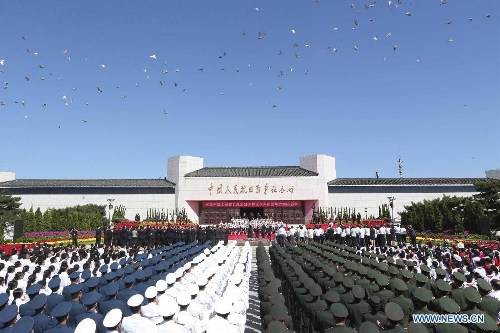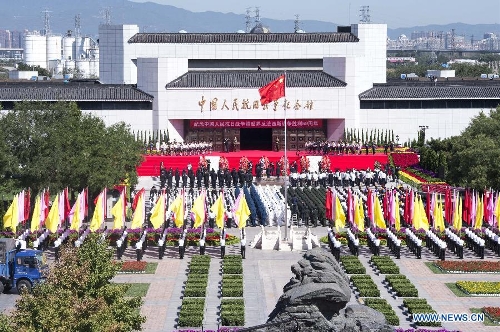HOME >>
Chinese leaders mark anti-Japanese war victory day
Source:Xinhua Published: 2014-9-3 12:56:52

A commemoration marking the 69th anniversary of the victory of the Chinese People's War of Resistance Against Japanese Aggression, is held at the Museum of the War of Chinese People's Resistance Aganist Japanese Aggression, in Beijing, capital of China, Sept. 3, 2014. (Xinhua/Ding Lin)

A commemoration marking the 69th anniversary of the victory of the Chinese People's War of Resistance Against Japanese Aggression, is held at the Museum of the War of Chinese People's Resistance Aganist Japanese Aggression, in Beijing, capital of China, Sept. 3, 2014. (Xinhua/Wang Ye)
China marked the 69th anniversary of Victory Day in the Anti-Japanese War for the first time since legislature ruled it an official observance day.China's top leaders attended a ceremony held Wednesday morning at the Museum of the War of the Chinese People's Resistance Against Japanese Aggression. Among those present were Chinese President Xi Jinping, Premier Li Keqiang, as well as leaders Zhang Dejiang, Yu Zhengsheng, Liu Yunshan, Wang Qishan and Zhang Gaoli.
In February, the Standing Committee of the National People's Congress allocated Sept. 3 as the official observance for Victory Day.
Officials stood in silent tribute during the ceremony. Presided over by Li Keqiang, they presented flower baskets to martyrs who sacrificed their lives in the war.
A salute of 14 guns was fired, symbolizing China's 14-year struggle against the Japanese invaders, which began Sept. 18, 1931 when Japanese troops attacked northeast China and lasted until their surrender in 1945.
A total of 3,500 doves were released later to remind people of the estimated 35 million Chinese soldiers and civilians who were killed or wounded by Japanese troops.
Later officials toured a museum exhibition demonstrating the great contribution Chinese people made to the victory of the World Anti-Fascist War.
Featuring more than 150 historical relics and 200 pictures and video materials, it comprehensively showed China's role as an important strategic pillar for allied forces in Asia Pacific and other contributions to the war.
Before the ceremony, leaders met with veterans, relatives of martyrs and family representatives for deceased foreigners who contributed to the victory of the war.
Posted in: Frontpage